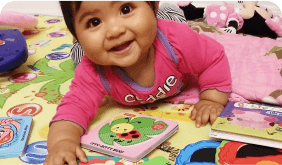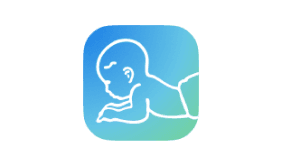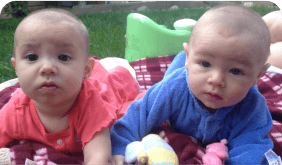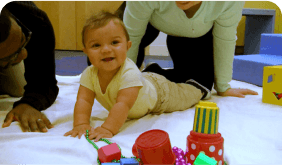From the moment baby is born, they are learning. Their brain is constantly expanding and making new neural connections, and they’re learning so much about this new world around them. It’s an amazing time of life! During the early months, baby is already learning to communicate. While baby may not say any words that you can understand until they are about a year old, they are watching you communicate and building their language skills throughout their first year of life. Baby language development starts way earlier than you would imagine!

You may hear a lot about how best to teach your baby to communicate with you. New research has shown that rhythmic speech, which includes sing-song patterns and nursery rhymes, may be the primary way that babies learn language in the first few months of life. In fact, some findings show that some babies can process rhythmic speech at as young as 2 months old!
So how can you use rhythmic speech with your little one? Try out these fun ways to communicate with baby.
Sing Nursery Rhymes to Baby
Nursery rhymes are the songs you know and love from childhood. These songs are perfect for little ones, because they have patterns of repeated words, soothing melodies and help with learning concepts such as counting. These are songs that are not only beneficial in the first year of life, but all the early years! You can sing these nursery rhymes to baby when you play together or when you’re soothing them as they go to sleep.

Use a Sing-Song Voice When Speaking to Baby
This type of talking goes by a lot of different names, including “infant-directed talk,” “baby talk,” or “parentese”. It is when a parent or caregiver changes their speech to make more melodic or exaggerated sounds. For many people, this type of talk comes naturally when they interact with a baby. Many studies have shown this helps with baby language development and getting baby’s attention. You can also do this during Tummy Time, for even more benefits!
Narrate Your Day
Narrating your day is a fun and easy way to expose little ones to language. Follow tips like emphasizing syllables or new words, speaking slowly, or singing songs and having fun with sounds while talking about what you are doing throughout the day.

Don’t Wait to Sing or Talk to Baby!
It might feel a little silly to sing or talk to a baby who is just a few days or weeks old—but it all makes a difference! Baby is always listening and learning from you, so the earlier your start singing or talking to them, the better.





